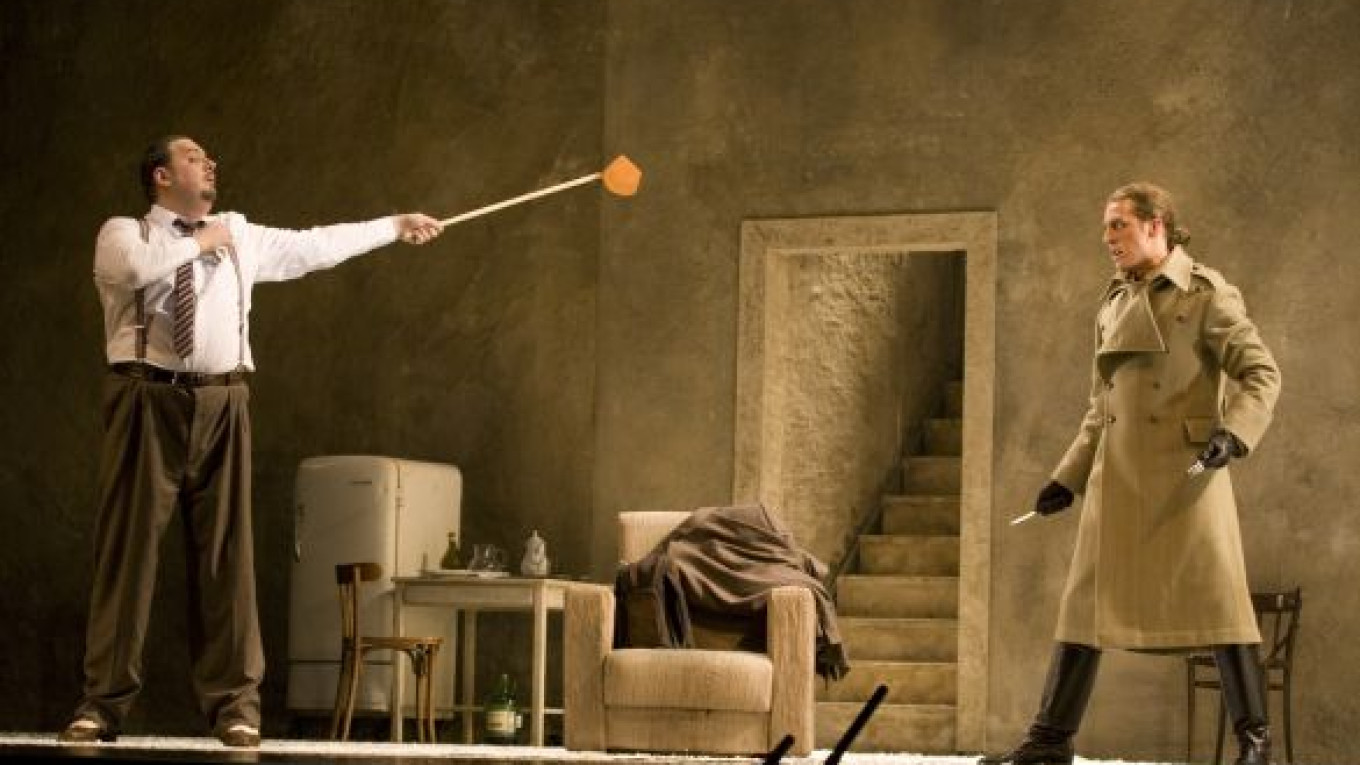With resources available for only two new productions of opera on its main stage this season, the Stanislavsky and Nemirovich-Danchenko Musical Theater picked Gioacchino Rossini’s “The Barber of Seville” as one of them. With so many operatic classics absent from the Moscow stage, it seemed rather disappointing to find the theater adding yet another version of “The Barber” to those quite recently staged at Helikon Opera and Novaya Opera — and at the latter in quite a superb production by the renowned British director Elijah Moshinsky.
Box office appeal no doubt had something to do with the decision. Rossini’s comic masterpiece is almost certain to ensure a full house. Perhaps the theater also regarded “The Barber” as an indispensable part of its repertory, its 1933 staging by the great Konstantin Stanislavsky himself having played there for seven of the nine decades since the theater’s founding. And certainly the theater must have thought that director Alexander Titel would come up with an original and inspired approach to the staging.
In its premiere the week before last, the production did indeed show originality, at least in its moving the action from 18th-century Seville to what appeared to be provincial Italy of the 1950s. But inspiration proved sadly lacking, and the overall result was a pretty barbarous “Barber,” one that stripped the opera of its elegance and subtlety — and even most of its comedy, except perhaps for those who can find humor in the rather lascivious spanking administered by Doctor Bartolo to his ward, Rosina, or in seeing the sly, scheming music master, Don Basilio, portrayed as a village idiot.
Most of the opera takes place in the drab, gray-walled courtyard of Bartolo’s house. Despite wintry weather and snow on the ground, this is where the Bartolo household appears to conduct most of its business. Indifferently exposed to the elements are a sofa, a dining table and chairs and a refrigerator, as well as the principal characters themselves, who frolic about in mostly lightweight clothing.
Though Titel wisely avoided the temptation to turn the frolicking into slapstick — a frequent vice in productions of “The Barber” — he also failed to come up with much by way of genuine comic invention. Falling decidedly flat were such great moments for a comic turn as Bartolo’s fatuous lecture to Rosina, Almaviva’s mischievous appearances disguised as a drunken soldier and a music master substituting for the supposedly ill Basilio.
I have mostly admired Titel’s work during his nearly two decades as artistic director of the Stanislavsky and Nemirovich-Danchenko’s operatic troupe. His masterful staging a year ago of Vladimir Kobekin’s opera “Hamlet (Danish) (Russian) Comedy” headed my list of last season’s best new productions and appears almost certain to garner awards at this year’s Golden Mask festival. But in a no doubt well-considered attempt to do something new and different with “The Barber,” he has unfortunately turned Rossini’s bright and cheerful comedy into little more than a rather gloomy charade.
The only outstanding vocal performance at the premiere was that of Alexei Kudrya, whose light lyric tenor and good sense of bel canto style proved a near-perfect fit for Almaviva. The role of Rosina was given over to a mezzo-soprano, as Rossini intended, not to the long-traditional coloratura soprano, now an anomaly on the stage (but still to be heard in Novaya Opera’s production, no doubt for lack of the right kind of voice among the theater’s mezzos). Yelena Maksimova sang the part reasonably well, though not without difficulty at the top and bottom of its range, and, to the extent that the production permitted, played it in appropriately minx-like fashion.
Arsen Sogomoyan brought a robust baritone to the role of Figaro, but lacked anything even remotely bel canto in style and seemed to have little impact on the proceedings once he had delivered the familiar aria “Largo al factotum” and sung his duet with Almaviva in the opening scene. Bass Roman Ulybin, so excellent in other roles at the theater, also proved stylistically inept in the music of Bartolo.
Titel’s concept of Basilio allowed bass Dmitry Stepanovich to display a full range of his usual scene-stealing tomfoolery. But even worse than enduring Stepanovich’s assortment of silly tricks was listening to a voice that completely lacked the smooth, rolling bass sounds required for the great aria “La calunnia” or, indeed, most of Basilio’s other music.
Maestro Volf Gorelik surprisingly seemed less at home with Rossini’s music than with that of an opera from only a slightly earlier era, Wolfgang Amadeus Mozart’s “Cosi fan tutte,” for which his conducting won him a Golden Mask award three years ago.
“The Barber of Seville” (Sevilsky Tsiryulnik) next plays on Feb. 27 at 7 p.m. at the Stanislavsky and Nemirovich-Danchenko Musical Theater, located at 17 Bolshaya Dmitrovka. Metro Chekhovskaya, Pushkinskaya. Tel. 629-2835, www.stanmus.ru.


